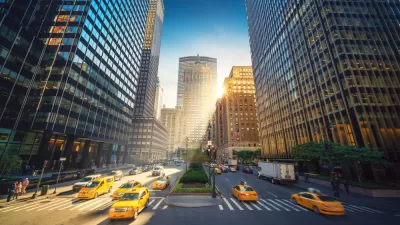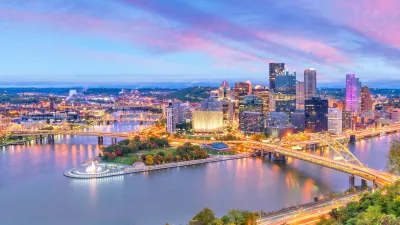The company is moving away from flashy new campuses in favor of converting existing buildings with interesting histories.

For years, tech giants have been building massive, new design-y headquarters, writes Nate Berg in Fast Company. “Increasingly though, Google is going a different route. Instead of solely building modern, amenity-rich campuses, the tech giant is putting more of its now-global real estate dollars into adaptively reusing old, significant, and interesting structures.”
In Los Angeles, an airplane hangar originally built by Howard Hughes for the construction of the Spruce Goose was bought by Google in the 2010s and converted into a 450,000-square-foot office complex. “Another project in Sunnyvale, California, is adapting a more recent piece of historic industrial architecture, turning a 1960s-era research and development facility of one of the first mainframe-computer makers into a 250,000-square-foot office building.”
“All this reuse is an office real estate strategy that makes a lot of sense in the hybrid work era coming out of the pandemic.” As Berg explains, “Bakker says making older buildings more energy efficient plays into Google’s sustainability goals, while also bolstering its environmental, social, and corporate governance (ESG) values. Doing so with very visible buildings and neighborhood projects becomes a form of marketing all on its own.”
FULL STORY: Google’s office strategy used to be new buildings. Now, it’s old warehouses

Montreal Mall to Become 6,000 Housing Units
Place Versailles will be transformed into a mixed-use complex over the next 25 years.

Planetizen Federal Action Tracker
A weekly monitor of how Trump’s orders and actions are impacting planners and planning in America.

DARTSpace Platform Streamlines Dallas TOD Application Process
The Dallas transit agency hopes a shorter permitting timeline will boost transit-oriented development around rail stations.

Study: 4% of Truckers Lack a Valid Commercial License
Over 56% of inspected trucks had other violations.

Chicago Judge Orders Thousands of Accessible Ped Signals
Only 3% of the city's crossing signals are currently accessible to blind pedestrians.

Philadelphia Swaps Car Lanes for Bikeways in Unanimous Vote
The project will transform one of the handful of streets responsible for 80% of the city’s major crashes.
Urban Design for Planners 1: Software Tools
This six-course series explores essential urban design concepts using open source software and equips planners with the tools they need to participate fully in the urban design process.
Planning for Universal Design
Learn the tools for implementing Universal Design in planning regulations.
City of Mt Shasta
City of Camden Redevelopment Agency
City of Astoria
Transportation Research & Education Center (TREC) at Portland State University
US High Speed Rail Association
City of Camden Redevelopment Agency
Municipality of Princeton (NJ)





























